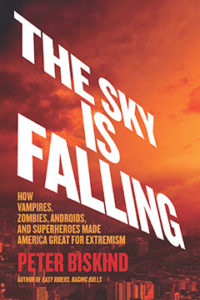
What Do Superheroes and Zombies Have to Do With the End of the World?
Peter Biskind on Pop Culture's Obsession with How It All Ends
Despite its trust in science, the postwar center made room for faith, so long as it cleaved to the tenets of pluralism. There was an uptick of religion during the 1950s, characterized by an interdenominational spirit that mirrored the political consensus. According to student of religion Ross Douthat, a “convergence [was] taking place towards a kind of Christian center.” Despite the claims of Catholics, Jews, Protestants, and what-have-you to exclusive access to God’s ear, they coexisted peacefully. It didn’t hurt that the spectacle of multifaith civil rights workers in the South praying, singing, and swaying while being beaten senseless by white deputies wielding clubs and cattle prods was beamed into American living rooms every night on the news. It sent the same message that Jon Snow was trying to deliver to Cersei: Sectarianism is passé, and therefore self-defeating.
“In other words, for all its forays into magic and fantasy, for all its dragons, witches, zombies, spells, priests, and priestesses, Game of Thrones by the end of Season 7, turns out to be about America, circa 2017. It’s a mainstream show adhering to centrist values.”
Generally speaking, excepting the run of biblical spectacles in the 1950s, religion was conspicuous by its absence from postwar movies. Even as late as 2014 the crop of high-profile biblical epics—both Noah and Exodus: Gods and Kings—flopped. The Hollywood community is generally a godless bunch, and indicative of the lowly place religion has traditionally occupied in show business, as of that year, over the previous two decades, only seven Oscar winners thanked God in their acceptance speeches, while 30 credited their good fortune to Harvey Weinstein.
Today, that has changed; shows of the ecumenical center with interfaith themes reflect conservative mainstream values, family, and religion, like the ones that pervaded ABC’s hit show Lost which first aired in September 2004. The show began with a bang, that is, a plane crash. Oceanic Airlines Flight 815 bound for Los Angeles from Sydney breaks up high in the air over the Pacific Ocean. The passengers, along with their ephemera—baggage, coats, books, magazines, soda cans, thumb-size vodka bottles—are sucked out of the plane like so many matchsticks and unceremoniously dumped onto sand beaches blanched salt white by the blazing sun. The laws of gravity would have predicted that they all should have died, but Lost doesn’t have much use for the laws of gravity. Miraculously, tumbling 35,000 feet to the ground doesn’t so much as muss their hair.
Lost ended, six seasons and 121 episodes later, in 2010. The intervening shows are devoted to a post-apocalypse purgatory that consists of an array of peekaboo glimpses of now-you-see-them-now-you-don’t monsters, sudden violence, torture, and dizzying disruptions of time and space until the survivors wind up in church to discover that they have been dead all along—perhaps—and only now do these ghostly infrequent travelers, dressed in their Sunday best, qualify for a nonstop flight to heaven, first-class, with no blackout dates.
Looking around this church in the show’s finale, we can’t help but notice that although Christian iconography predominates, it is an ecumenical smorgasbord displaying the sacred totems of other religions as well—Judaism, Islam, Buddhism, and so on. After all, this is the church of network television.
The feel-good finale is so banal, it became a touchstone for how not to end a series provoking George R.R. Martin to an inspired bit of vituperation: “Even as early as the second season and certainly the third season, I started saying, how the hell are they going to pull all of this together?” He added, “And then when I reached the end . . . they hadn’t pulled it altogether [sic], in fact, they left a big turd on my doorstep.”
Inclusion and diversity were central to pluralism, but firm boundaries were still important because they marked the line between those who qualified for membership in the center and those who did not and were thus excluded. Although such ideological cleansing seemed to fly in the face of pluralism, centrists found a friend in Karl Popper, who furnished them with a work-around in an influential book first published in 1945 called The Open Society and Its Enemies, in which he wrote, “If we extend unlimited tolerance even to those who are intolerant . . . then the tolerant will be destroyed, and tolerance with them.”
To the center, Popper’s “intolerant” were the “Geronimos” who turned their backs on the pluralist welcome wagon, thereby condemning themselves to the so-called lunatic fringe, a group for whom the world looked very different from the way it appeared to the center.
__________________________________

From The Sky Is Falling: How Vampires, Zombies, Androids, And Superheroes Made America Great For Extremism. Courtesy of The New Press. Copyright © 2018 by Peter Biskind.
Peter Biskind
Peter Biskind is a contributing editor to Vanity Fair, a writer for Esquire, and the author of the classic bestsellers Easy Riders, Raging Bulls and Down and Dirty Pictures. He lives in upstate New York. His latest book, The Sky Is Falling is available from The New Press.












